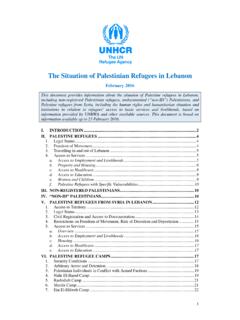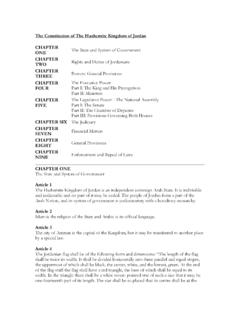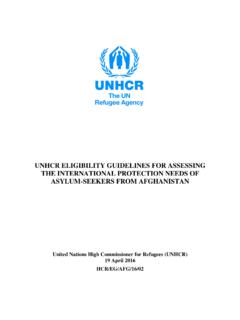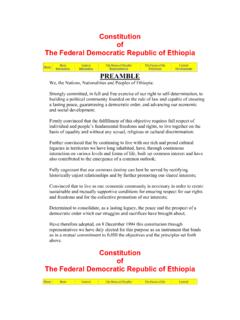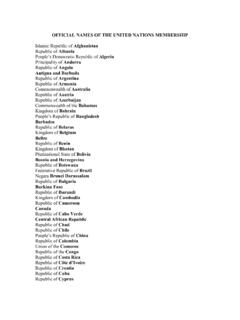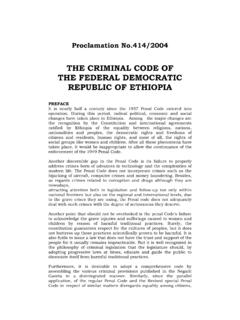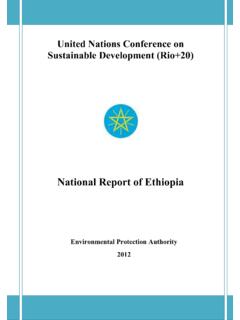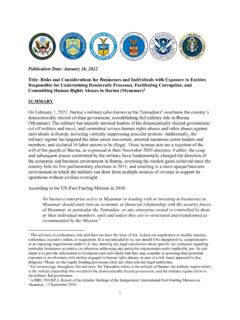Transcription of The Revised Family Code - Refworld
1 federal Negarit Gazetta of the federal democratic republic of EthiopiaThe Revised Family CodeFederal Negarit Gazetta Extra Ordinary Issue No. 1/2000 The Revised Family Code Proclamation No. 213/2000 Addis Ababa 4thDay of July, 2000 PROCLAMATION Revised Family CODEPROCLAMATION OF 2000 PreambleWHEREAS, the Family , being the natural basis of society, shall be protected by the society and the state, and that one of the means of protection is effected by regulating and governing Family relation by law;WHEREAS, it has become essential to make the existing Ethiopian Family law in accordance with the socio-economic development of the society and, above all, with the Constitution of the country, and, in particular, realizing that marriage shall be basedon the free consent of the spouses, and that it is necessary to provide the legal basis which guarantees the equality of the spouses-during the conclusion, duration and dissolution of marriage;WHEREAS, it has become necessary to amend the existing law in such a way that it gives priority to the well-being, upbringing and protection of children in accordance with the Constitution and International Instruments which Ethiopia has ratified.
2 WHEREAS, it is found necessary to settle disputes arising in Family by a competent organ in a just and efficient manner;WHEREAS, in order to realize these objectives, it has become essential that a Family law be enacted by the House of Peoples Representatives to be applicable in administrations that are directly accountable to the federal Government;NOW, THEREFORE, in accordance with Article 55 (1) of the Constitution of the federal democratic republic of Ethiopia, it is hereby proclaimed as follows:1. Short TitleThis proclamation may be cited as the " Revised Family Code Proclamation No. 213/2000."2. Effective DateThe Revised Family Code of 2000, as published in a separate volume appearing as Extraordinary Issue No.
3 1 of 2000 of the federal Negarit, Gazeta, shall come into force as of the 4th dayDone at Addis Ababa, this 4th day of July, GIDADA (DR.)RESIDENT OF THE federal DEMOCRATICREPUBLIC OF ETHIOPIACHAPTER ONECONCLUSION OF MARRIAGES ection /GeneralArticle I. Various Forms of )Marriage may be concluded before an officer of civil )Notwithstanding the provisions of Sub-Article (1) of this Article, marriage may be concluded in accordance with the religion or custom of the future 2. Marriage Concluded before an Officer of Civil shall be deemed to be concluded before an officer of civil status when a man and a woman have appeared before an officer of civil status for the purpose of concluding marriage and the officer of civil status has accepted their respective 3.
4 Religious marriage shall take place when a man and a woman have performed such acts or rites as deemed to constitute a valid marriage by their religion or the religion of one of 4. Marriage According to according to custom shall take place when a man and a woman have performed such rites as deemed to constitute a valid marriage by the custom of the community in which they live or by the custom of the community to which the belong or to which one of them celebrated abroad in accordance with the law of the Place of celebration shall be valid in Ethiopia so long as it does not contravene public 2. Essential Conditions of MarriageArticle 6 valid marriage shall take place only when the spouses have given their free and full 7.
5 Neither a man nor a woman who has not attained the full age of eighteen years shall conclude )Notwithstanding the provisions of Sub-Article (1) of this Article, the Minister of Justice may, on the application of the future spouses, or the parents or guardian of one of them for serious cause, grant dispensation of not more than two 8 ) Marriage between persons related by consanguinity in the direct line between ascendants and descendants, is ) In the collateral line a man cannot conclude marriage with his sister or aunt; similarly, a woman cannot conclude marriage with her brother or 9. ) Marriage between persons related by affinity in the direct line is ) In the collateral line, marriage between a man and the sister of his wife, and a woman and the brother of her husband is 10.
6 Filiation not Established existence of a bond of natural filiation which is commonly known to the community is sufficient to render applicable the impediments to marriage referred to in Articles 8 and 9, notwithstanding that the filiation is not legally 11. person shall not conclude marriage as long as he is bound by bonds of a preceding 12. Representation not )Each of the future spouses shall personally be present and consent to the marriage at the time and place of its )Notwithstanding the provisions of Sub-Art. (1) of this Article, marriage by representation may be allowed by the Ministry of Justice where it has ascertained that there is a serious cause and the person who intended to do so has fully consented thereto.
7 Article 13. Fundamental ) Marriage concluded as a result of error in consent shall not be valid. 2) Consent is deemed to be vitiated as a result of error where such error is a fundamental ) Without prejudice to the provisions of Sub-Article (2) of this Article, the following shall be considered to be fundamental errors:(a) error on the identity of the spouse, where it is not the person with whom a person intended to conclude marriage; (b) error on the state of health of the spouse who is affected by a disease that does not heal or that can. be genetically transmitted to descendants;(c) error on the bodily conformation of the spouse who does not have the requisite sexual organs for the consummation of the marriage;(d) error on the behaviour of the spouse who.
8 Has the habit of performing sexual acts with person of the same 14. Consent Extorted by ) Marriage concluded as a result of consent which is extorted by violence shall not be ) Consent is deemed to be extorted by violence where it is given by a spouse to protect himself or one of his ascendants or descendants, or any other close relativefrom a serious and imminent danger or threat of danger. Article 15. Judicially Interdicted ) Any person who is judicially interdicted shall not conclude marriage unless authorized, for that purpose, by the ) An application to this effect may be made by the interdicted person himself or by his 16. Period of ) A woman may not remarry unless one hundred and eighty days have elapsed since the dissolution of the previous ) The provisions of Sub-Article (1) of this Article shall not apply where:(a) the woman gives birth to a child after the dissolution of her marriage;(b) the woman remarries her former husband;(c) it is proved by medical evidence that the woman is not pregnant;(d) the court dispenses the woman from observing the period of 3.
9 Opposition to MarriageArticle 17. may be made when marriage is to be concluded in violation of one of the essential conditions of 18. Opposition by whom to the conclusion of marriage shall be made only by the following persons:(a) In case of age, by the parents of the minor, public prosecutor or any other interested person;(b) In case of relationship by consanguinity or affinity, by the ascendants of the future spouses, or the ascendants of one of them, or by the brothers or sisters of the future spouses, who have attained the age of eighteen years or by the public prosecutor;(c) In case of bigamy, by the person alleging to have had a prior marital relationship with the bigamous spouse or by the public prosecutor;(d) In case of judicial interdiction, by his guardian, or by the public 19.
10 Form and Time of Opposition1) Opposition to marriage shall be made in writing and submitted to the officer of civil status within fifteen days from the notification of the ) The officer of civil status shall receive the opinion of the future spouses before deciding on the 20. Decision on the ) The officer of civil status shall decide on the opposition within five ) The decision of the officer to celebrate the marriage shall be ) Where the opposition is sustained, the officer of civil status shall refuse to celebrate the ) In such case, the officer of civil status shall give reasons of his refusal and inform same forthwith to the future 21. ) The future spouses or one of them may petition to the court against refusal under Sub-Article (3) of Article ) Where the court overrules the decision of the officer of civil status, such officer shall celebrate the 4.





